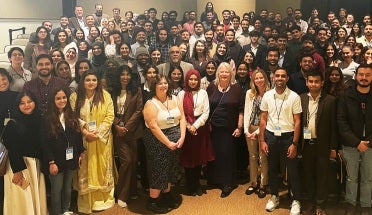
Texas Global Grant Enables Climate Change Research in Vienna
- Mar 16, 2022
- Global Programs and Innovation
Nearly $10,000 in the form of a Faculty Research Seed Grant from The University of Texas at Austin will allow assistant professor Benjamin Leibowicz and an accompanying student to conduct research on climate change mitigation strategies in Austria this summer.
Faculty Research Seed Grants coordinated by Texas Global offer applicants up to $10,000 for collaborative research with institutions abroad. Leibowicz will be based at the International Institute for Applied Systems Analysis (IIASA) in Vienna, where he will use the institute’s integrated assessment models to study how climate change may be effectively mitigated by demand-side strategies.
Supply-side strategies focus on changing energy sources or deploying carbon dioxide removal technologies. In contrast, demand-side strategies seek to modify the demand for goods and services by targeting consumer choices and adoption of technologies, behaviors and lifestyles that are more sustainable.
“We have this hypothesis that [the models] are not fully capturing how powerful [demand-side strategies] can be as levers, basically, to mitigate climate change,” said Leibowicz. “The results of these models go into informing, for example, energy and climate policy in things like the Paris Agreement. … Or we can run these models to understand what policies might be effective nationally.”
Following the summer trip, Leibowicz said, he and his accompanying student will continue their research at UT Austin in hopes that future Longhorns also can spend a summer at IIASA pursuing similar research.
“In the future, other people will be able to go abroad and collaborate with people and explore new ideas because that’s how innovation happens,” said Arnulf Grubler, emeritus research scholar at IIASA. “Sometimes it’s complicated. But in many cases, it can be fun—and in all cases, it’s very fruitful. So it enriches your own thinking and your scientific career. That’s what these international exchange programs should do.”



